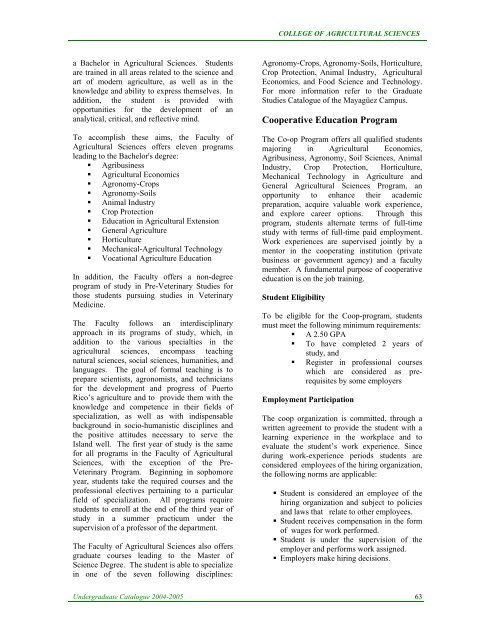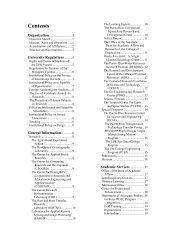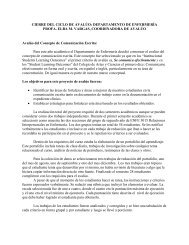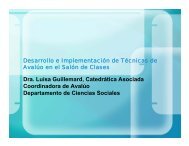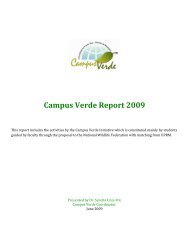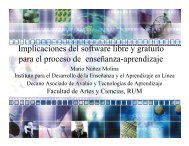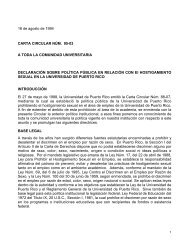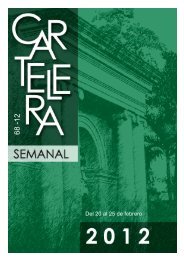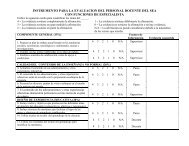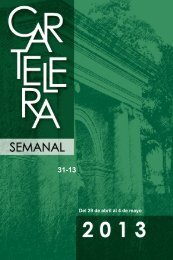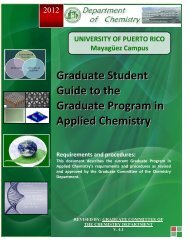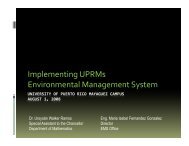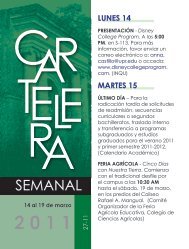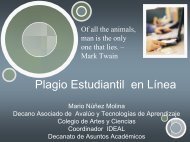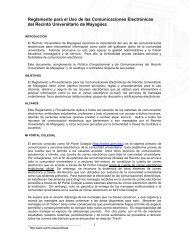Undergraduate Catalogue - UPRM
Undergraduate Catalogue - UPRM
Undergraduate Catalogue - UPRM
You also want an ePaper? Increase the reach of your titles
YUMPU automatically turns print PDFs into web optimized ePapers that Google loves.
COLLEGE OF AGRICULTURAL SCIENCES<br />
a Bachelor in Agricultural Sciences. Students<br />
are trained in all areas related to the science and<br />
art of modern agriculture, as well as in the<br />
knowledge and ability to express themselves. In<br />
addition, the student is provided with<br />
opportunities for the development of an<br />
analytical, critical, and reflective mind.<br />
To accomplish these aims, the Faculty of<br />
Agricultural Sciences offers eleven programs<br />
leading to the Bachelor's degree:<br />
• Agribusiness<br />
• Agricultural Economics<br />
• Agronomy-Crops<br />
• Agronomy-Soils<br />
• Animal Industry<br />
• Crop Protection<br />
• Education in Agricultural Extension<br />
• General Agriculture<br />
• Horticulture<br />
• Mechanical-Agricultural Technology<br />
• Vocational Agriculture Education<br />
In addition, the Faculty offers a non-degree<br />
program of study in Pre-Veterinary Studies for<br />
those students pursuing studies in Veterinary<br />
Medicine.<br />
The Faculty follows an interdisciplinary<br />
approach in its programs of study, which, in<br />
addition to the various specialties in the<br />
agricultural sciences, encompass teaching<br />
natural sciences, social sciences, humanities, and<br />
languages. The goal of formal teaching is to<br />
prepare scientists, agronomists, and technicians<br />
for the development and progress of Puerto<br />
Rico’s agriculture and to provide them with the<br />
knowledge and competence in their fields of<br />
specialization, as well as with indispensable<br />
background in socio-humanistic disciplines and<br />
the positive attitudes necessary to serve the<br />
Island well. The first year of study is the same<br />
for all programs in the Faculty of Agricultural<br />
Sciences, with the exception of the Pre-<br />
Veterinary Program. Beginning in sophomore<br />
year, students take the required courses and the<br />
professional electives pertaining to a particular<br />
field of specialization. All programs require<br />
students to enroll at the end of the third year of<br />
study in a summer practicum under the<br />
supervision of a professor of the department.<br />
The Faculty of Agricultural Sciences also offers<br />
graduate courses leading to the Master of<br />
Science Degree. The student is able to specialize<br />
in one of the seven following disciplines:<br />
Agronomy-Crops, Agronomy-Soils, Horticulture,<br />
Crop Protection, Animal Industry, Agricultural<br />
Economics, and Food Science and Technology.<br />
For more information refer to the Graduate<br />
Studies <strong>Catalogue</strong> of the Mayagüez Campus.<br />
Cooperative Education Program<br />
The Co-op Program offers all qualified students<br />
majoring in Agricultural Economics,<br />
Agribusiness, Agronomy, Soil Sciences, Animal<br />
Industry, Crop Protection, Horticulture,<br />
Mechanical Technology in Agriculture and<br />
General Agricultural Sciences Program, an<br />
opportunity to enhance their academic<br />
preparation, acquire valuable work experience,<br />
and explore career options. Through this<br />
program, students alternate terms of full-time<br />
study with terms of full-time paid employment.<br />
Work experiences are supervised jointly by a<br />
mentor in the cooperating institution (private<br />
business or government agency) and a faculty<br />
member. A fundamental purpose of cooperative<br />
education is on the job training.<br />
Student Eligibility<br />
To be eligible for the Coop-program, students<br />
must meet the following minimum requirements:<br />
• A 2.50 GPA<br />
• To have completed 2 years of<br />
study, and<br />
• Register in professional courses<br />
which are considered as prerequisites<br />
by some employers<br />
Employment Participation<br />
The coop organization is committed, through a<br />
written agreement to provide the student with a<br />
learning experience in the workplace and to<br />
evaluate the student’s work experience. Since<br />
during work-experience periods students are<br />
considered employees of the hiring organization,<br />
the following norms are applicable:<br />
• Student is considered an employee of the<br />
hiring organization and subject to policies<br />
and laws that relate to other employees.<br />
• Student receives compensation in the form<br />
of wages for work performed.<br />
• Student is under the supervision of the<br />
employer and performs work assigned.<br />
• Employers make hiring decisions.<br />
<strong>Undergraduate</strong> <strong>Catalogue</strong> 2004-2005 63


